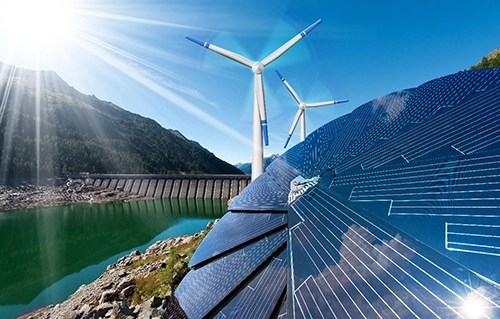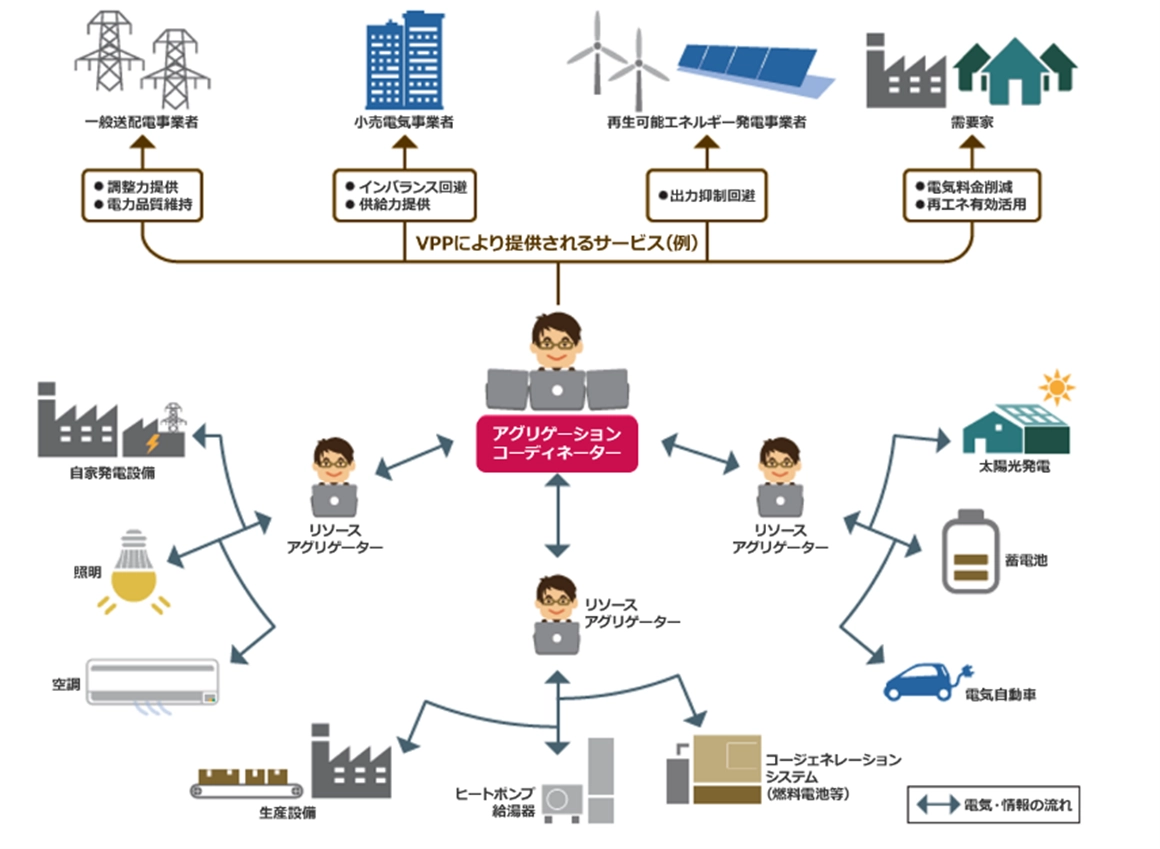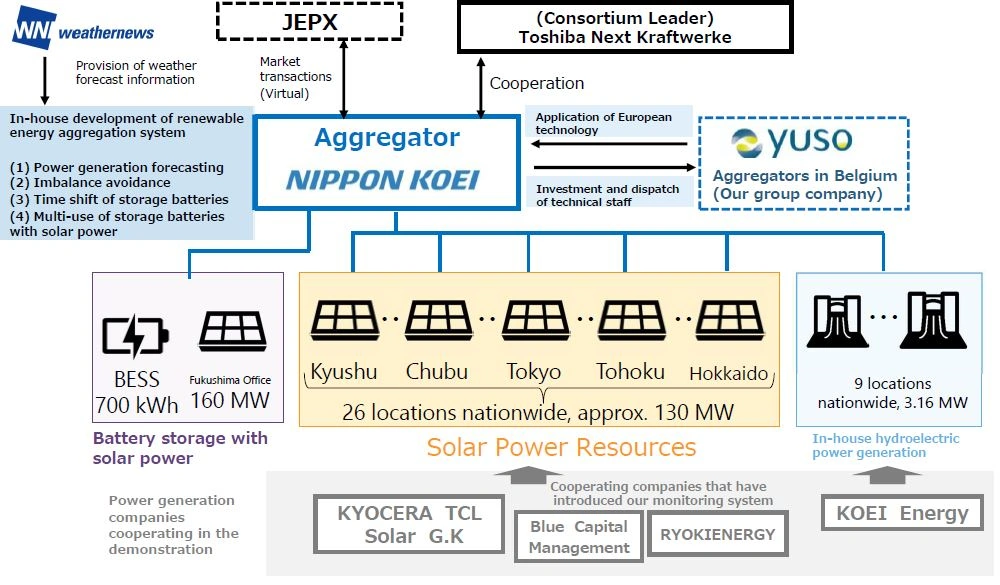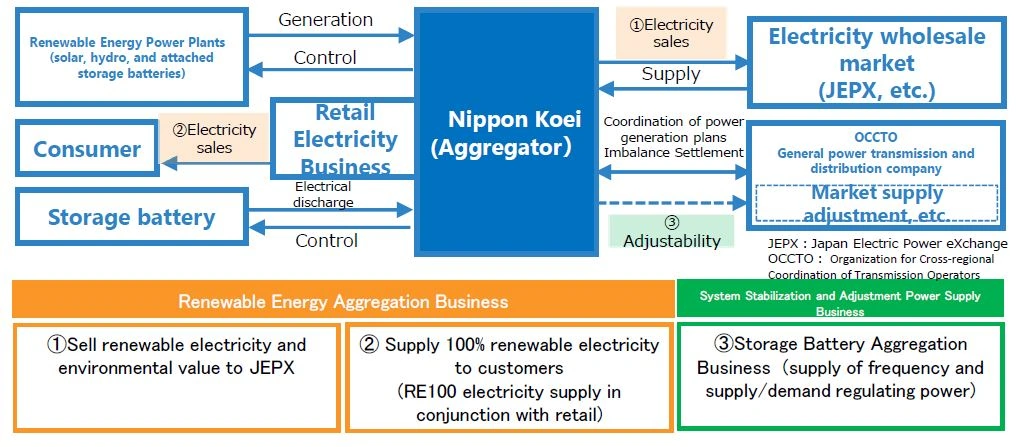Aggregation of Renewable Energy Generation Aiming to participate in the aggregation business in 2022
Release:
Update:
NEW

NEEDS
Aiming for RE100 from stable supply of renewable energy
Increasing the ratio of renewable energy in power generation and reducing greenhouse gas emissions are the definite trends in the world and society today. However, the percentage of thermal power generation in Japan was 75.7% (*1), as of Fiscal Year 2019. Of this percentage, oil shares 6.8%, coal is 31.8%, and liquefied natural gas (LNG)is 37.1%; thus, Japan is still reliant on fossil fuels. In contrast, the breakdown of the power generation method that does not emit greenhouse gases comes from nuclear power generation at 6.2% and renewable energy generation at 18.1%.
In October 2020, as the Paris Agreement was drawing attention to carbon neutrality around the world, then-Prime Minister Yoshihide Suga announced a policy to reduce domestic greenhouse gas emissions to "practically zero" by 2050. In order to achieve this goal, Japan has begun to make a concerted effort in the public, academic, and private sectors.
Japan's renewable energy policy reached a major turning point in April 2022. The feed-in tariff system (revised FIT Law), which was focused on increasing the number of power generation facilities, will be revised and replaced by the feed-in premium (FIP) system to integrate renewable energy into the free electricity market. The FIP system is designed to reduce the burden of the renewable energy levy on the Japanese people, and will require renewable energy producers to perform balancing tasks (power generation forecasting and planning, electricity sales, imbalance responsibility, etc.) that were exempted under the FIT system.
This system has already been enforced in Europe and the United States, but this is the first attempt to realize in Japan. In order to enforce the system, the entire country has begun fostering aggregators who can bundle power plants and perform power generation balancing operations on behalf of renewable energy power producers.
Nippon Koei has been selected for the "FY2021 Subsidy for Next Generation Technology Development and Demonstration Project Using Distributed Energy Resources such as Storage Batteries (Renewable Energy Aggregation Demonstration Project among Renewable Energy Generation and Other Aggregation Technology Demonstration Projects)".
This project was publicly solicited by the Ministry of Economy, Trade and Industry (METI) through the Sustainable Co-Creation Initiative (SII).
The biggest challenge for renewable energy is the stable supply of electricity. In particular, the issue is that the power generation status of solar power, wind power, and hydropower with flow-in are dependent conditions and fluctuate depending on weather conditions. In support of the government's efforts to achieve carbon neutrality by 2050, Nippon Koei is strongly promoting preparations for the implementation of the aggregator license system and FIP system, which will be introduced in the next fiscal year, as well as the commercialization of these systems once they are implemented.
SOLUTION
As an aggregator with knowledge of renewable energy from upstream to downstream
https://www.enecho.meti.go.jp/category/saving_and_new/advanced_systems/vpp_dr/about.html


In order to expand the ratio of renewable energy, comprehensive knowledge and skills are needed, not only in power generation, but also in the electricity market and transactions with consumers.
First of all, the verification experiment project that has been adopted will involve the verification of technologies that combine renewable energy generation facilities derived from natural energy sources such as solar power generation, which is highly variable, with distributed energy resources such as storage batteries. Specifically, this will involve technologies for predicting the amount of electricity generated in order to secure a balance between supply and demand, avoiding imbalance, and securing profitability through time shifting using storage batteries.
In addition, Nippon Koei has been providing consulting services, design, manufacturing, construction, and operational support for hydropower generation since its establishment. Currently, the company has nine hydroelectric power plants in Japan (with an output of approximately three megawatts), all of which are operated under subordinate conditions using the FIT system, and these are the target of this demonstration project.
In anticipation of the coming of a new era of electric power, Nippon Koei integrated all departments related to electric power in July 2020, establishing the Energy Management Business Division to consolidate internal knowledge. In Europe, the company is leading the way in the field of renewable energy, it has established the Nippon Koei Energy Europe B.V. (hereinafter referred to as NKEE), headquartered in Rotterdam, and invested in YUSO B.V. (hereinafter referred to as YUSO), headquartered in Waregem, which is collaborating on an energy storage project in Belgium.
POINT
To be a standard-bearer for solving Japan's energy and environmental problems and achieving the sustainable development goals (SDGs)

At November 2021, when the details of the aggregator license system and FIP system to be introduced in 2022 were still being fine-tuned, it was still unclear whether or not the aggregation business of renewable energy generation will be profitable beyond a certain level. It is safe to say that most of the companies involved in the electric power industry are considering entering the business only after the specifications are finalized or based on the trends of the companies ahead of them. However, Nippon Koei has expressed its intention to be the first to tackle this issue in order to support the plight of Japan, which lacks energy resources, and the government's guideline to become carbon neutral by 2050.
In addition, increasing the ratio of renewable energy generation is essential for achieving the SDGs, which have been adopted by the United Nations as actions for the future in the global environment. What Nippon Koei has seen in its current efforts to expand renewable energy is that both local governments and companies are very interested in RE100 energy. At Nippon Koei, we will hasten the establishment of technology to provide a "stable supply" of "face-to-face renewable energy electricity," and declare that we will become the cornerstone of Japan's leap forward as a next-generation aggregator.
Reference
- ※1Energy White Paper 2021



